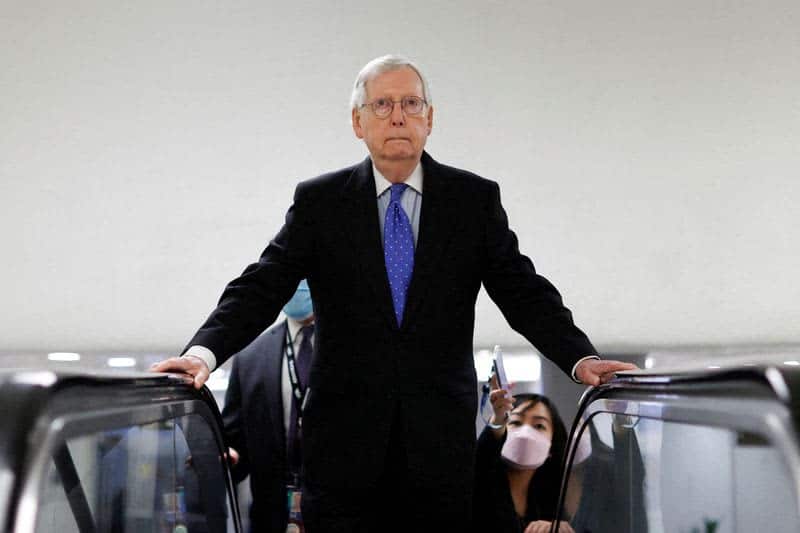Reuters

By David Morgan
WASHINGTON (Reuters) – Top U.S. Senate Republican Mitch McConnell’s goal to project an image of moderation for his party as it seeks to regain control of Congress this year has taken a hit with its fresh infighting over last year’s Capitol attack and censure of two lawmakers.
McConnell at an afternoon news conference is expected to address the Republican National Committee’s censure last week of Representatives Liz Cheney and Adam Kinzinger, the only two Republicans serving on the House of Representatives select committee investigating the deadly Jan. 6, 2021, rampage, according to a person familiar with the matter.
The RNC took its action on Friday and called the Democratic-led committee’s inquiry an attack on “legitimate political discourse.” Supporters of then-President Donald Trump stormed the Capitol in a failed attempt to prevent Congress from certifying President Joe Biden’s 2020 election victory.
Republicans are hoping to regain majorities in the House and Senate in the Nov. 8 midterm elections.
McConnell, the Senate minority leader and one of his party’s most wily political tacticians, has been trying to paint Biden as a former moderate radicalized by the Democratic Party’s left wing. McConnell’s hopes of projecting an image of moderation for his own party could help Senate Republican candidates in key states.
Lawmakers close to McConnell found themselves on the defensive about the RNC censure resolution.
“They said, in the resolution, they wanted Republicans to be unified. That was not a unifying action,” said Senator John Cornyn of Texas.
Other Senate Republican leaders were quick to acknowledge the trouble that party divisions might pose for Republican Senate candidates.
“If we want to win the elections in November, there are better things for us to be focused on,” said Senator John Thune, the chamber’s No. 2 Republican after McConnell.
“The focus right now needs to be forward, not backward. If we want to get majorities in the fall, then it’s better to turn our fire on Democrats and not on each other,” Thune added.
Democrats may be vulnerable, particularly considering Biden’s falling public approval numbers in opinion polls. The party of sitting presidents typically loses congressional seats in the first midterm elections after winning the White House.
McConnell has sought to cast Biden and his pricy “Build Back Better” social spending plan that is stalled in the Senate as creatures of the Democratic Party’s left wing. McConnell has accused Biden of ignoring troubles facing American families such as inflation including higher energy costs.
“If the president starts acting like a moderate, like he campaigned, we can do business,” McConnell told Fox News last month.
While McConnell is calling for bipartisanship, he often has been a partisan warrior himself. As majority leader, he refused to consider Democratic President Barack Obama’s nominee to fill a Supreme Court vacancy and last year said he might block Biden’s nominees to the high court if Republicans gain Senate control. He also has used the Senate’s filibuster rule to thwart parts of Biden’s legislative agenda including voting rights.
McConnell did delivered critical Republican votes last year for two bipartisan priorities – a $1 trillion infrastructure bill and a deal to avert a default on the federal government’s debt. Both prompted enraged statements from Trump, who has called for McConnell’s ouster from his Senate leadership post.
McConnell has also said he is open to a bipartisan effort to revamp an 1887 law that Trump tried to use to overturn Biden’s 2020 victory. The push to reform the law called the Electoral Count Act could succeed, after Democrats failed to pass their voting rights legislation amid unified Republican opposition.
(Reporting by David Morgan; Editing by Will Dunham and Scott Malone)



